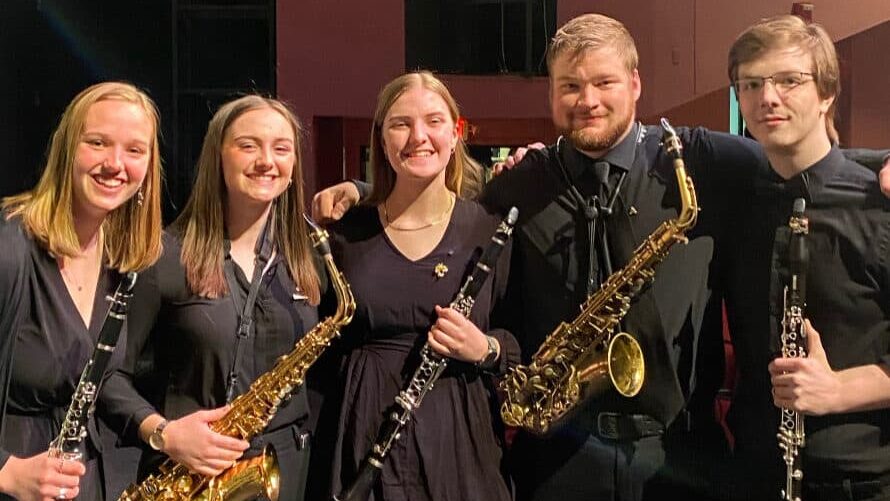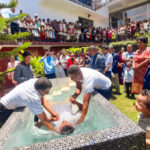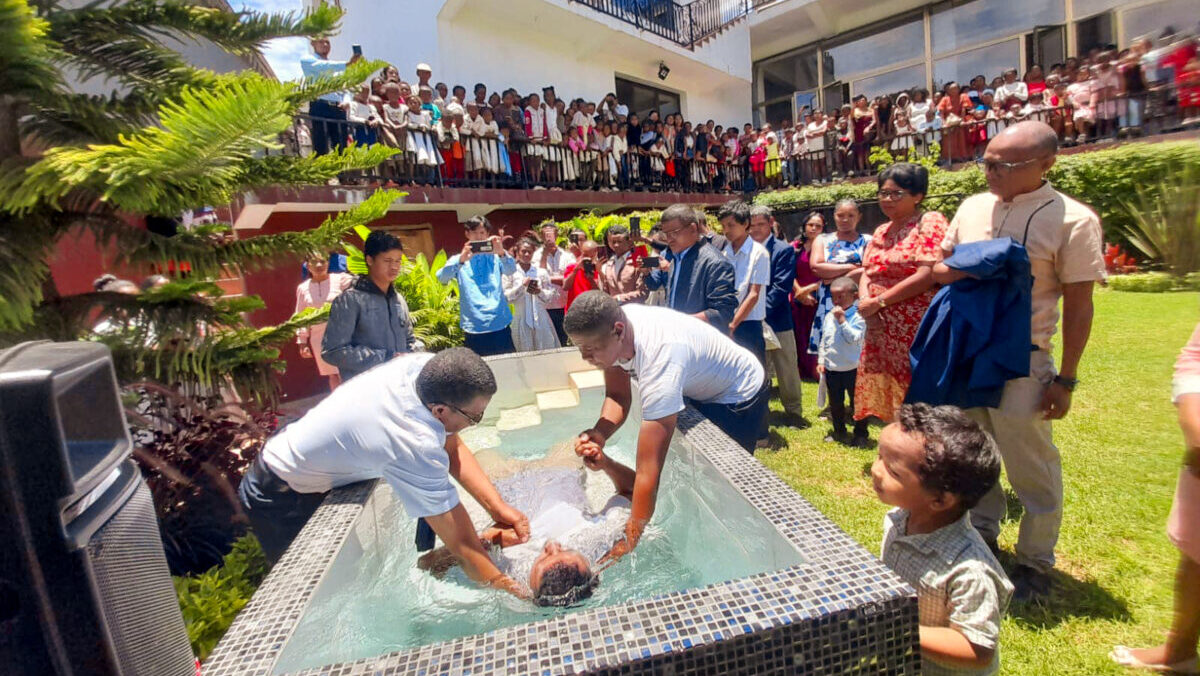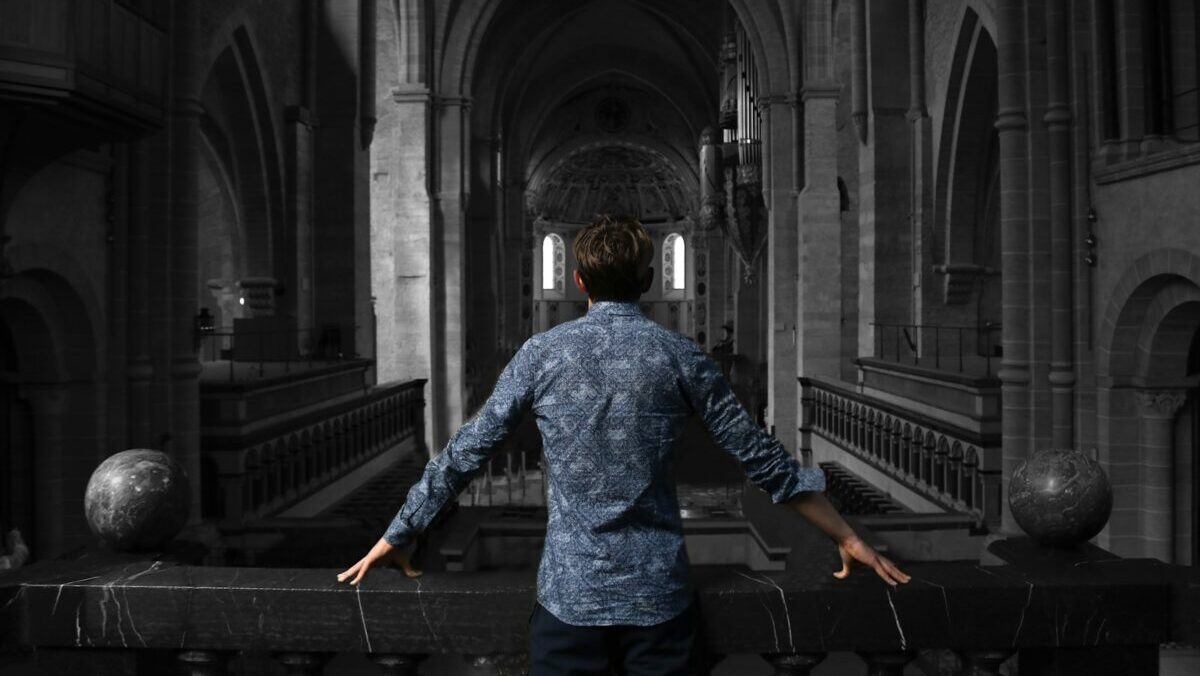Payton Beucher didn’t expect to find himself back at Northwest Missouri State University in the spring of 2023 after a three-year gap that included multiple school transfers.
He also didn’t expect to find Jesus. But he did.
As Beucher was preparing to move back to Maryville to study clarinet at NWMSU, Brooklyn Ellis and Zach Ringo were feeling led to start a fine arts Bible study. The two close friends had been music education majors and shared the experience of being Christians in the time-consuming world of fine arts.
“We didn’t feel like we had the opportunity to have a lot of community,” Ellis recalled.
She and Ringo were both involved in The Lighthouse (a Baptist student group), but their complicated music schedules made it difficult to participate. They’d led an informal Bible study the previous year with two other classmates, but they knew there were other believers in their department who hadn’t found a source of Christian community on campus.
“We talked about the idea to create our own, working around the schedules of music people and making it accessible,” Ellis said.
‘Open-door policy’
After a defining moment discussing it with another music major friend, they decided to start a fine arts Bible study. None of the three had much experience leading something like that, so they went to campus missionary Jason Yarnell for advice. He offered guidance and provided study materials on the Gospel of John.
They started meeting weekly in The Lighthouse’s prayer room to pray, and began inviting people to the study — but they didn’t want it to just be a community for believers.
“We had an open-door policy for anyone who wasn’t a believer,” Ringo said. “These are the people we are around all day, every day. We see them in almost every class, in every ensemble, everywhere.”
Beucher was one of the friends they invited.
“My initial instinct was to say ‘thank you’ but decline,” he recalled. He was raised by agnostic parents and had virtually no spiritual upbringing.
“I ended up being very atheistic for many years,” Beucher said. “I was struggling with many mental health issues at the time, and in general was just angry and unwilling to ask myself questions about life beyond the surface level.”
After finding treatment that improved his mental health, he felt ready to re-examine what he believed. That, on top of the death of his grandfather several months earlier, pushed “the nagging feeling of wanting to find truth” to the forefront.
Instead of declining the invitation, Beucher said yes.
“The general mind-state I found myself in was one of openness,” he recalled. “I had already been re-examining my beliefs and knew deep down that I wanted to search for truth, and everything that had happened in my life at the time gave me the push I needed to go and listen.
“It really felt like I had been led back to Northwest, and now it felt like I had been led to this Bible study.”
Truth
Throughout the spring semester the group studied John on Friday afternoons in the fine arts building with anywhere from six to 15 in attendance. As Beucher wrestled with the meaning of truth, Ellis and Ringo were realizing the profound but weighty opportunity in front of them.
Many of their peers had had negative experiences with church and Christians, but “they are people we already have built a rapport with,” Ringo said. “If we can be that good example of Christ, then they might want to come check something out.”
College fine arts departments are notoriously tight-knit — students eat, breathe, work and play together. That realization challenged them to hold themselves to a higher standard and represent Christ well to their peers.
“The Lord convicted me that the way I carry myself is important,” Ellis noted.
She bought a bag of bracelets printed with, “HWLF,” meaning “He would love first” in response to the question, “What would Jesus do?” Some took the bracelets as reminders that their actions, reactions and attitudes have an impact on how others perceive Christ.
“People aren’t always going to react well to the gospel,” Ellis acknowledged. “But you don’t give people the excuse to throw it back in your face.”
Beucher came to the Bible study week after week, and also started attending The Lighthouse.
“He expressed pretty openly that he hadn’t had much exposure to Christianity. That was sort of baffling to me,” Ellis admitted. “When I think about people in our country, I always think they’ve heard the basics of Christianity. There was so much he had never heard of. We spent a lot of time exposing him to the basic ideas of Christianity.”
Beucher would take those ideas, reflect on them, then return with thoughtful, probing questions. The believers in the group could sense the Lord was working in his heart, so they allowed the conversation to follow his questions. One week they were discussing the attributes of God when something struck Beucher deeply.
“He went off on a rabbit trail, and we went on it with him,” Ringo recalled. “We could all see the gears turning in his head.”
Finally they came to the answer: the gospel. One group member, Ari, drew the “bridge” illustration and explained the gospel.
Ellis and Ringo could see Beucher’s search for truth intensify after that. One night after the BSU gathering Beucher sought out Jason Yarnell. Through their conversation, he realized a profound flaw in his thought process about faith.
“I had it in my head that there would be a point — a certain amount of reading done, things learned, questions asked and answered — that I would feel confident putting my faith in Christ,” Beucher recalled.
But his conversation with Yarnell showed him that “that point, that specific moment when you’ve heard enough to make an informed decision, doesn’t really exist as I thought it did,” Beucher said. “There will always be more questions, more reading, more listening and thinking to be done. And if that’s the case, that I’m not ‘filling up a progress bar to conversion,’ then what am I waiting for?”
Joy
Shortly after that Ellis received a text from Beucher saying he’d pulled over on the side of the road and given his life to Christ.
“If that specific moment I thought I was progressing towards isn’t some place in the future, then that moment is actually right now,” he said he realized as he was driving. “It was actually Good Friday that day … that I put my faith in Jesus.”
Watching their friend come to faith was an unexpected joy for Ellis and Ringo.
“Talking to Payton and seeing how God was working in his life even before he came to Northwest, this was just the final push before he fully came to Christ,” Ringo said. “It was really crazy to see his growth.”
Beucher plans to stay involved with the fine arts Bible study and Lighthouse this year. He said he’s thankful for the journey that led him to Christ, though it involved pain and hardship along the way.
And he longs for others to experience the hope and healing he has.
“In music, and the fine arts in general, there are a lot of people who are hurting and angry and lost,” Beucher lamented. “I know this to be true because I was one of them not too long ago. I am continually trying my best to be a light with my faith in a place that is very much in need of it.”
Though neither Ellis nor Ringo is a music major anymore, both are still very involved in the music department through ensembles and marching band. As they move into the fall semester their goal is to build community, have personal accountability and provide the opportunity to expose people to the gospel.
“The goal is to get people to come, expose them to Christianity, be available to answer questions they may have, be present and be a good ambassador for Christ,” Ellis said.
These students and their believing friends are committed to maximizing the opportunity before them.
“It’s our job to go out into the mission field and spread the Word of God,” Ringo said. “This is the mission field we’ve been placed in.”
EDITOR’S NOTE — This story was written by Britney Lyn Hamm and originally published by the Pathway.








